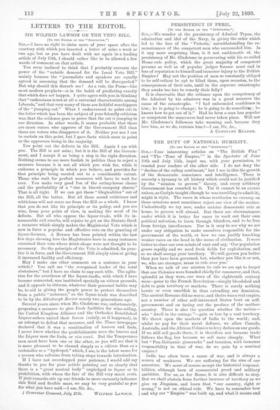LETTERS TO THE EDITOR.
SIR WILFRID LAWSON ON THE VETO BILL. [To THE EDITOR OF THE "SPECTATOR."] SIR,—I have no right to claim more of your space after the courtesy with which you inserted a letter of mine a week or two ago, but as you have dealt with me again in a leading article of July 15th, I should rather like to be allowed a few words of comment on that article.
You seem inclined to think that I probably overrate the power of the "outside demand for the Local Veto Bill," mainly because the "journalists and speakers are equally agreed in assuming that the demand will be disregarded." But why should this disturb me ? As a rule, the Press—like most modern prophets—is in the habit of predicting exactly that which does not happen. I quite agree with you in thinking that " enthusiasm is not at all a universal eharacteristic among Liberals," and that very many of them are faithful worshippers of the "jumping cat." What I endeavoured to point out in the letter which has been the subject of your friendly criticism was, that the evidence goes to prove that the cat is jumping in our direction. In other words, it seems probable that there are more voters who approve of the Government Bill than there are voters who disapprove of it. Neither you nor I can be certain on this point, but I gave facts which seem to point to the approvers being in the majority.
You point out the defects in the Bill. Again I am with you. The Bill is not mine; but it is the Bill of the Govern- ment, and I accept it as being a step in the right direction. Nothing seems to me more foolish in politics than to reject a measure because it is not all which you wish for, while it endorses a principle in which you believe, and provides for that principle being carried out to a considerable extent. Those who wait for perfect measures will have to wait for ever. You make very good fun of the eating-house clause and the probability of a "rise in biscuit-company shares." That is all right. If we can get these "illogicalities" out of the Bill, all the better. But all these sound criticisms and witticisms will not scare me from the Bill as a whole. I know that you do not like its principle or its policy, and you are wise, from your point of view, in making the most of its defects. But all who oppose the liquor-trade, with its in- numerable evil results, will rejoice to get on the Statute-Book a measure which simply makes the Magisterial Veto which is now in force a popular and effective veto on the granting of liquor-licences. A Return has been printed within the last few days showing how the Magistrates have in many instances exercised their veto where drink-shops were not thought to be necessary. So the principle of the Veto is admitted, its prac- tice is in force, and the Government Bill simply aims at giving it increased facility and efficiency.
May I make one other comment on a sentence in your article ? You call me "the recognised leader of the total abstainers;" but I have no claim to any-such title. The agita- tion for the overthrow of the liquor-traffic, with which I have become connected, was instituted specially on citizen grounds, and it appeals to citizens, whatever their personal habits may be, to aid in giving the people power to protect themselves from a public nuisance," as the liquor-trade was described to be by the Edinburgh Review nearly two generations ago.
Several years since, when Mr. Gladstone was, unfortunately, proposing a measure to give fresh facilities for wine-selling, the United Kingdom Alliance and the Orthodox Established Liquor-sellers united their forces (vainly, as it happened), in an attempt to defeat that measure, and the Times newspaper declared that it was a combination of knaves and fools. I never knew whether the prohibitionists were the knavea and the Liquor men the fools, or vice versd . But the Temperance men must have been one or the other, so you will see that it is more pleasant to be classed simply as a citizen than as a teetotaller or a " hydropot," which, I see, is the latest name for a person who refrains from taking steps towards intoxication.
If I have not overstepped your patience, I would add my thanks to you for your article pointing out so clearly that there is a "great neutral body" nnpledged to liquor or to prohibition, with whom the fate of the Bill very much rests. If your remarks stir up our friends to more earnestly influence this fluid and flexible mass, we may be very grateful to you for what you have said.—I am, Sir, 84c,, 1 Grosvenor Crescent, July 17th. WILFRID LAWSON,


































 Previous page
Previous page